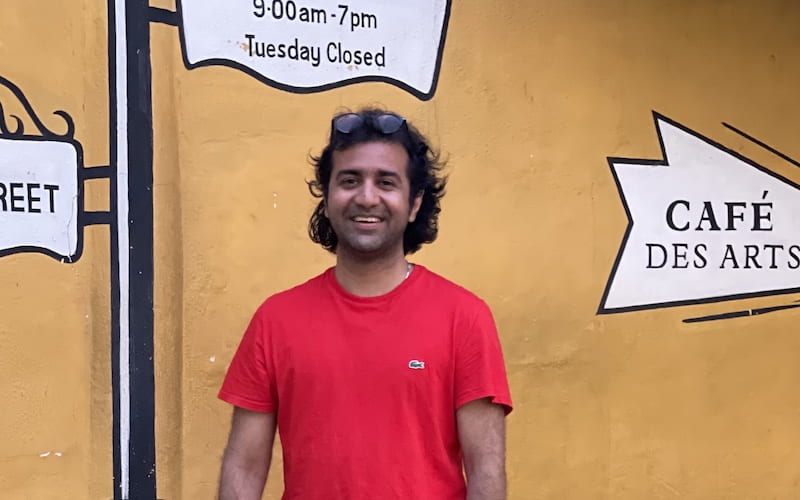Q&A with PAHUS founder Dr Kartik Sharma
By j.chua, on 24 March 2021
 Dr Kartik Sharma is an alumnus of the UCL Health Humanities Centre, filmmaker and founder of Public Arts Health and Us (PAHUS), an interdisciplinary organisation undertaking public engagement and evaluation initiatives to raise awareness of health and social issues through the medium of film and the arts.
Dr Kartik Sharma is an alumnus of the UCL Health Humanities Centre, filmmaker and founder of Public Arts Health and Us (PAHUS), an interdisciplinary organisation undertaking public engagement and evaluation initiatives to raise awareness of health and social issues through the medium of film and the arts.
PAHUS was conceptualised in Bangkok, Thailand and is based in New Delhi, India. It comprises of a board of international academics, artists and activists and frequently collaborates with universities, government agencies, research institutes, legal firms, filmmakers and arts-based organisations both in India and the UK. With support from the Hatchery, UCL Innovation & Enterprises’s startup incubator, PAHUS will soon begin operations in London.
Here, Kartik tells us how he’s been collaborating on a range of different UCL projects including a documentary and upcoming global arts and science exhibition opening on 26 March 2021, as well as his future plans and vision for PAHUS .
Can you tell us a little bit about the documentary you’re currently shooting?
I’m shooting a travel documentary called Myths and Beliefs in Rajasthan, a very colourful, diverse and culturally rich state in India approximately the size of France. It’s a UCL-led project from Pro-Vice-Provost (South Asia) Professor Monica Lakhanpaul and it is our latest collaboration together. I have travelled through six to seven cities scattered all across Rajasthan to film this documentary. I’ve had the opportunity to interview many different people from all walks of life, including royalty living in forts and regular people wandering upon camels. It will be another five or six months before the film sees the light of day but I’m really excited about it. I love filmmaking and using it to make public health and social issues more accessible, digestible and enjoyable for a regular audience. Today’s my last day in Rajasthan and tomorrow I’m flying back to Delhi to continue work on another UCL-led project, The Early Years: A Global Art & Science Exhibition.
How was the idea for The Early Years exhibition born and what will it involve?
The process started about a year ago when Professor Monica Lakhanpaul approached me with the idea of putting on a global art and science exhibition about the first 1000 days of a child’s life. I had previously worked with Monica to design a coffee table book for the PANChSHEEEL Project and directed a film for the NEON project. The upcoming exhibition is led by Monica and UCL Great Ormand Street Institute of Child Health, in collaboration with PAHUS and our India-based partner India Alliance.
Initially we wanted the exhibition to be held in-person at a popular art gallery in Delhi, but our plans shifted when COVID-19 struck and we decided to hold it virtually. On 26 March we’ll unveil the virtual platform with films, paintings and photographs collected from an India-focused art campaign. These will be showcased in an immersive way and later housed within the PAHUS web portal. We’ll also have a panel discussion on “The Power of Arts in Public Health.” Panellists will include Professor K. VijayRaghavan, Principal Scientific Advisor to the Government of India; award-winning photographer Mr Raghu Rai; Sir Mark Tully, former Bureau Chief of BBC New Delhi; and senior members from the World Bank, Save the Children, India and UKRI India.
How will the UCL Hatchery programme support your vision for PAHUS?
I was granted an entrepreneurial visa from the UCL Hatchery programme, which I’ll be using to set up a new base for PAHUS in London. It was very competitive and I’m very grateful for the opportunity. I hope it will help further expand my vision of making research more accessible and interesting for the general public! I hope to strengthen the link between my work in India and the UK, and eventually expand to South East Asia and East Asia. I envision PAHUS growing to be a public relations and engagement agency that crosses boundaries and acts as a bridge between the public and research – this has become all the more important as we have seen so much misinformation flying about during the pandemic.
When you build a bridge you need a strong concrete foundation with dependable pillars and UCL has been that foundation for me over the years. I am very grateful to my Health Humanities tutor, Professor Sonu Shamdasani, who allowed me to make my course as eclectic as possible. I was able to complete my dissertation, The Story of Madness in Indian Cinema, with first class honours thanks to Professor Sonu’s patience and guidance. I must also thank Mr Jivko Hristov from the UCL Hatchery who really helped me hone my business idea to make it work in a UK setting. Last but not least, I must thank Professor Monica Lakhanpaul for her continuing mentorship – I feel very lucky to have met a UCL professor who is equally passionate about using the arts and filmmaking in research settings.
As a line goes in Cinema Paradiso, “whatever you end up doing, love it”. I somehow found myself founding PAHUS – and to be honest I am truly loving this journey.
 Close
Close

